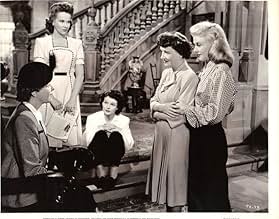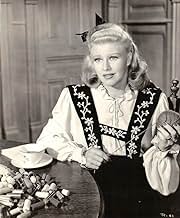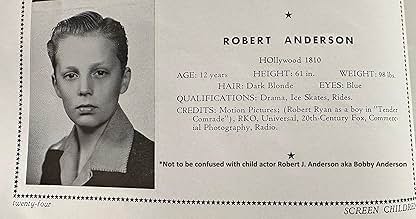Jo Jones, a young defense plant worker whose husband is in the military during World War II, shares a house with three other women in the same situation.Jo Jones, a young defense plant worker whose husband is in the military during World War II, shares a house with three other women in the same situation.Jo Jones, a young defense plant worker whose husband is in the military during World War II, shares a house with three other women in the same situation.
- Awards
- 4 wins total
- Chris Jones as a boy
- (uncredited)
- Western Union Girl
- (uncredited)
- Minor Role
- (uncredited)
- Boy
- (uncredited)
- Minor Role
- (uncredited)
- Doctor
- (uncredited)
- Mrs. Flanagan - Jo's Mother
- (uncredited)
- Waldo Pierson
- (uncredited)
- Baby
- (uncredited)
- Boy
- (uncredited)
- Director
- Writer
- All cast & crew
- Production, box office & more at IMDbPro
Featured reviews
Ginger Rogers is more muted in this role, not really one of her strongest performances, but she is good. Robert Ryan, her husband in the film, is actually playing a NICE guy here. This film also includes Ruth Hussey, Kim Hunter, Patricia Collinge and Jane Darnell. They are never really used to a great advantage here.
The story is simple enough. These women were left behind by their men who went of to war. They move in together to share expenses and responsibility. They try to run the house democratically but run into problems. If you are looking for a nice little movie to watch, this can be that movie. I do have this in my video collection and have watched it about 3 times.
Rogers was a member in good standing of Hollywood's right wing and Tender Comrade came under the scrutiny of the House Un-American Activities Committee. With writer Dalton Trumbo and director Edward Dmytryk two of the Hollywood Ten involved it had a star place in the proceedings.
With the word 'comrade' in the title that's if you'll pardon the pun a red flag in front of these bulls. I mean isn't that what Communists call each other? And the plot concerning four Rosie the Riveteer types teaming up to buy a house and share expenses for the duration, clearly Communist and subverting the American ideal of rugged individualism. And dialog talking about a more unselfish world. This bares investigation.
Ginger, along with other marrieds Ruth Hussey, Patricia Collinge, and Kim Hunter all decide to live together and it seems like a practical decision. They make another one when since they're all doing factory work and come home bone tired they pool part of their salaries and hire a live-in housekeeper Mady Christians. This woman is a refugee from Germany and she provides some valuable insights into the foe their husbands are fighting.
Tender Comrade like so many films of the WW2 era talked a lot about building a better world and God knows what is wrong with that? It turned out to be a dream, but God help us if we ever have a world where no one dreams of making it better.
We also have some flashback scenes that are done well with Ginger and her husband Robert Ryan in the service. They show a typical Mr.&Mrs. Young America at the time and they had a universal identification.
Kim Hunter's husband comes home on leave and he's played by Richard Martin, one of the few times you will see him on film not playing Chit Jose Gonzalez Bustamante Rafferty. Treasure this film for that alone. And also for Ginger Rogers fine and eloquent soliliquy at the end.
It wasn't only Dmytryk and Trumbo who got blacklisted. So did Kim Hunter, Patricia Collinge, and Mady Christians. Lot of political casualties came out of this very fine film about the WW2 homefront.
In fact, in "Tender Comrade," Trumbo presents us with a puzzle: How could a writer responsible for so much hokey, amateurish dialogue (noted by other reviewers) ever get a reputation as being a great or even a good writer? I admit there were two bright spots in "Tender Comrade" that deserve appreciation for the writer: near the beginning, when two strangers comfort each other as their loved ones depart for the war, and when one character tells another how her marriage "proposal" came about.
Trumbo, though, being Trumbo later has a silly bit when Jo refers to the socialist plan the group adopts ("from each according to her ability ") as "democracy," further demonstrating his confusing of two different and distinct applications as the same.
"Democracy" is a more or less political term describing how leaders are chosen (if, for some reason, anyone wants leaders), and "socialism" is a more or less economic term and more or less philosophical term describing how material goods are more or less shared distributed, anyway. ("Socialism" means government ownership of the means of production, to be more pedantic.) There was nothing wrong with the democratically decided idea of voluntary communalism among the housemates, but if a viewer knows Trumbo's predilection for collectivism at least for others, though not so much for himself the whole scene is discomfiting.
(An excellent book that portrays Trumbo and others, and shows the dichotomy between what they preached, including sometimes in their scripts, and how they lived is "Hollywood Party: How Communism Seduced the American Film Industry in the 1930s and 1940s" by Lloyd Billingsley. It is probably the best book yet on that era. Read especially about Trumbo and his mansion and the lavish parties he loved to throw, even during the times the soldiers were dying.)
Jo's last monologue went on for too long, and really didn't say much it was apparently another failed attempt by Trumbo at being profound and dramatic.
But Ginger Rogers said a lot, even with Trumbo's words. She was a much, much better actress than she seems to be generally regarded. She was much, much more than a great dancer.
With all my complaints about Trumbo, his moronic politics, the lame plot, and his poor writing, still this is a pretty good movie.
It brings back, though not especially well, a particular time in American history.
One of the great ironies of that era: Trumbo waxed indignant about the Nazis and the war they instigated. Yet it is the politics of Trumbo and the other collectivists, Nazis and Communists and other kinds of socialists and fascists, that together created the climate that allowed the unmitigated horrors of World War II.
The collectivist notions that people are not sovereign individuals but are cogs in the machinery of the state, that they must obey their masters, that they must cheerfully march off to war, to kill and/or be killed, that led to the tens of millions of deaths.
Trumbo must share the blame for that evil. He was a vehement proponent of that vicious nonsense.
Still, the cast overcomes the weaknesses of the script. If you watch it on Turner Classic Movies, ignore Robert Osborne's ignorant introduction and closing comments, and concentrate on the people, on their concerns and their efforts at overcoming adversity, on how they deal with their menfolks' being in harm's way, on their daily difficulties, including rationing.
"Tender Comrade" is worth watching.
Four war wives who work in a munitions plant decide that if they pool their salaries and resources that instead of four individual run down rooms for rent that they can rent one spacious house with a bedroom for each, a kitchen, a living room, and a housekeeper. They sell one of the two cars they have between them and use the money to fix up the one remaining car and share it. Apparently this is Communism. Let's just ignore the fact that, at the time, movies were being made that were loaded with pro Russian propaganda because the Americans needed the Russians in the war effort. That was then this is now, as they say.
Other than that, it treads pretty traditional wartime material. One wife (Ruth Hussey) was a bit of a good time girl before the war and rather resents the fact that her good-time husband joined the navy before Pearl Harbor even happened. Another (Kim Hunter) got married on the spur of the moment and had to see her husband off that afternoon. Another (Patricia Collinge) has both a son and a husband in the war.
The central figure, though, is war wife Jo Jones (Ginger Rogers), and most of the film is about her relationship with her soldier/husband Chris (Robert Ryan) before the war as she flashes back to various scenes from their marriage. This part of the film uses a strange device. Whenever there is a scene in which Jo reminisces about Chris, the scene switches to a shot of the two of them in the distance, holding hands with clouds surrounding them, like they are in heaven, before launching into the flashback.
This gets pretty sentimental at times, and Ginger verges on hamming it up, but it did hold my interest for the rather long running time and is a splendid time capsule of the war years.
Did you know
- TriviaThis film was introduced as evidence when director Edward Dmytryk and writer Dalton Trumbo were hauled before the House Un-American Activities Committee, which was investigating them on suspicion of being Communists. Despite the film's many flag-waving speeches, the communal living arrangements of the ladies in the film was cited as evidence of how Dmytryk and Trumbo attempted to brainwash unsuspecting American moviegoers with Communist propaganda. As even more damning evidence, there was the use of the word "Comrade" in the title.
- GoofsWhen Chris comes around the hanging laundry in Jo's flashback, we hear the end of his whistling "You Made Me Love You," but his face is totally relaxed, and clearly not that of a person who is whistling.
- Quotes
Jo Jones: We're going to pool all of our salaries and we'll pay the rent, take care of the expenses of the house, and what's left over, we'll split five ways. You see, we're running this joint like a democracy!
Manya Lodge: Like a democracy! Oh, that's good! That's good. Once, in Germany, we had a democracy. But we...
Helen Stacey: You lost it.
Manya Lodge: Nein. We did not lose it. We let it be murdered - like a little child.
- Crazy creditsTO MY WIFE - Teacher, Tender Comrade Wife, A fellow-farer true through life, Heart-whole and soul-free, The August Father, Gave to me. Robert Louis Stevenson
- ConnectionsFeatured in Hollywood the Golden Years: The RKO Story: Dark Victory (1987)
- SoundtracksSymphony No. 40 in G minor K. 550
(1788) (uncredited)
Written by Wolfgang Amadeus Mozart
First movement played on the radio in the opening scene
- How long is Tender Comrade?Powered by Alexa
Details
- Runtime1 hour 42 minutes
- Color
- Aspect ratio
- 1.37 : 1

































